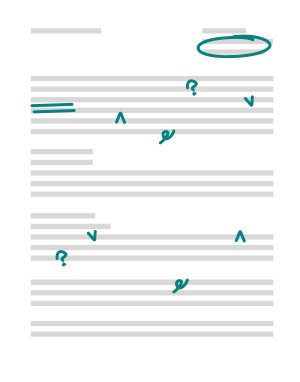
You’re journeying along quite nicely in your career, thank you very much, and everything seems to be falling into place. Then wham! You get a health diagnosis that hits you like a ton of bricks. It means you’ll have to sideline your career for a while.
In this post, we’ll show you the best way of explaining medical leave on a resume in 2023, including when you’re caring for a loved one or have had to take time out to recover from an illness or serious injury.
Employment gaps were always a problem for job seekers, and resumes that contained those gaps could easily be dismissed by hiring managers who preferred to see a more consistent work history throughout.
But since the pandemic, this view has shifted. Many US employees will have gaps during 2020, and beyond, due to COVID-19, whether that’s because the industry they were part of didn’t function during this time or they were bedridden with COVID and were unable to work.
But how to explain medical leave on a resume that involves a leave of absence due to illness and do it in such a way that employers won’t doubt your fitness for future employment?
How do medical leave gaps occur?
Taking medical leave from work can happen for a variety of reasons. You may find yourself ill for an extended period of time – leaving you unable to perform your job duties. There are three major causes of medical leave:
Prevalent diseases such as cancer, with the chances of one in two men and one in three women in the US getting it, can sometimes force you to take an extended medical leave lasting for months, or even years, while you battle the illness and recover to good health.
Perhaps you suffered a serious injury that left you facing a long time of physical rehabilitation before you could rejoin the workforce.
It could be the case where you simply had to leave work in order to care for a loved one. Because long-term care costs are so high, many families find it more cost-effective to serve as caregivers for close relations in these situations.
Sometimes, these types of absences aren’t readily understood by prospective employers and hiring managers – which means it’s critically important that you know exactly how to explain medical leave on your resume and cover letter.
Factors to consider on how to explain medical leave on your resume
It might be tempting to include an explanation that offers full disclosure about the circumstances surrounding your leave of absence. After all, what could be simpler than just laying out all the facts on the table, even down to the date of your previous surgery? But you should be careful about being too detailed as this could create unforeseen complications.
By law, you don’t have to provide those details since the Americans with Disabilities Act protects your medical information from such disclosure. Moreover, an employer who receives that type of information could be placed in an awkward position.
The last thing you want is to be hired because a prospective employer is mindful of being accused of discrimination. You also don’t want to be denied employment because a hiring agent secretly wonders whether your medical needs could be more trouble than you’re worth.
Tips on how to explain medical leave on a resume
Below are some tips that can ease the way forward with explaining a medical leave of absence.
Use years, not months
If you’ve been out of work for a matter of months with an illness, you can mitigate any red flags by adopting the system of showing how long you worked at a role using just years and not detailing out months. This will minimize any gaps you might have. For full transparency, though, you can explain any gaps more fully and personably in a cover letter.
Use a functional resume format
Consider using a functional resume. This type of resume allows you to emphasize your skills and strengths while reducing the focus on your work history. As such, it can be an excellent way of addressing large gaps – the kind you might experience with a medical leave issue.
Expert Tip
It’s also an option when you have little or no relevant professional experience for the position you’re targeting. To explore other formats, check out this ZipJob post on choosing the right resume format.
How to address medical leave when it’s due to an illness
For a lot of job seekers, addressing medical leave related to an illness or injury on a resume can be challenging. Many get so caught up in the details that it’s easy to forget the broader goals on which they should be focused.
So, if you have a lengthy gap to explain, remember these important tips:
Be direct but brief. Offer no more information than is necessary. The goal is to quickly address the issue to get it out of the way, so you can immediately refocus on the more positive attributes of your career.
Provide information on dates when you took medical leave, but there is no need to go into the nature of the medical concern. If you don’t want to disclose your illness, simply write, “Medical leave of absence,” and include the dates.
Medical leave on resume example
Medical Leave of Absence 5/2020 – 8/2020
IDT, Newark, New Jersey 11/2018 – 4/2020
Marketing Analyst
Researched and analyzed marketing trends in telecom.
Analyzed and tracked a marketing budget of $500,000.
Deployed new marketing campaigns in collaboration with the marketing team of 15.
Utilized Excel to migrate and organize data from various sources.
Contributed to the IDT internship program guide for 2018.
If the leave involved a battle against a major illness or disease, you may be able to turn that to your advantage. For conditions like cancer, there is a certain sense of accomplishment when you beat the disease. If you want to include extra details about your leave of absence, use powerful words and phrases that demonstrate your achievement.
For example:
“Took medical leave of absence to focus on battling with cancer. Successfully overcame the disease, following more than a year of treatment and recovery.”
Again, focus your resume on the positive attributes you can bring to the new job. You don’t want to ignore your medical leave, but you also don’t want the hiring agent to dwell on it, either.
How to address medical leave when you were a caregiver
When your leave was due to taking time off because of a loved one’s illness, the explanation can often be easier to manage, as you can highlight empathy and other interpersonal skills.
Check out the pointers below on how to achieve this.
Be concise. Unless you learned new skills during your time as a caregiver, there’s no reason to focus too much on what you did during this period of your life.
Be prepared to discuss in greater detail during an interview, but have a strategy ready that is designed to refocus the conversation back to your strengths.
Provide the date and reason for the absence, and briefly describe it. A good example of that would be, “Full-time caregiver for a terminally ill family member.”
Example of listing caregiver on a resume
Full-time caregiver for a family member 5/2020 – 8/2020
IDT, Newark, New Jersey 11/2018 - 4/2020
Marketing Analyst
Researched and analyzed marketing trends in telecom.
Analyzed and tracked a marketing budget of $500,000.
Deployed new marketing campaigns in collaboration with the marketing team of 15.
Addressing medical leave in a cover letter
Being as brief as possible when explaining medical leave on your resume is best. The advantage of a cover letter is you can use this to dispense with the details of any leave succinctly. This will then free you up to focus your resume on the skills, achievements, and qualifications relevant for the job at hand.
Focus on being the right person for the job
Explaining medical leave on a resume might feel awkward, but the key thing to remember is to explain it in an honest and straightforward way without lingering over it – and then move on to convincing the hiring agent that you’re the right person for the job.
Good luck with your continued job search.
If you’re still unsure how to explain medical leave on your resume, there is help in the form of ZipJob’s free resume review. You can upload your resume and have it reviewed, with tangible pointers as to how you can improve those job-seeking documents.
Recommended reading:

Written by
Elizabeth Openshaw, Editor & Content Writer, Elizabeth Openshaw, Editor & Content Writer
Elizabeth Openshaw is an Elite CV Consultant with over 12 years of experience based in Brighton, UK, with an English degree and an addiction to Wordle! She is a former Journalist of 17 years with the claim to fame that she interviewed three times Grand Slam winner and former World No.1 tennis player, Andy Murray, when he was just 14 years old. You can connect with her at Elizabeth Openshaw | LinkedIn.
